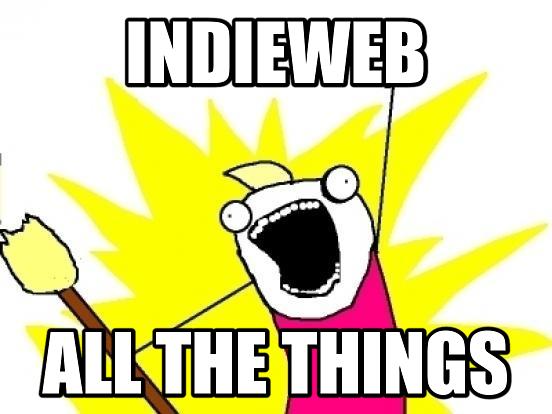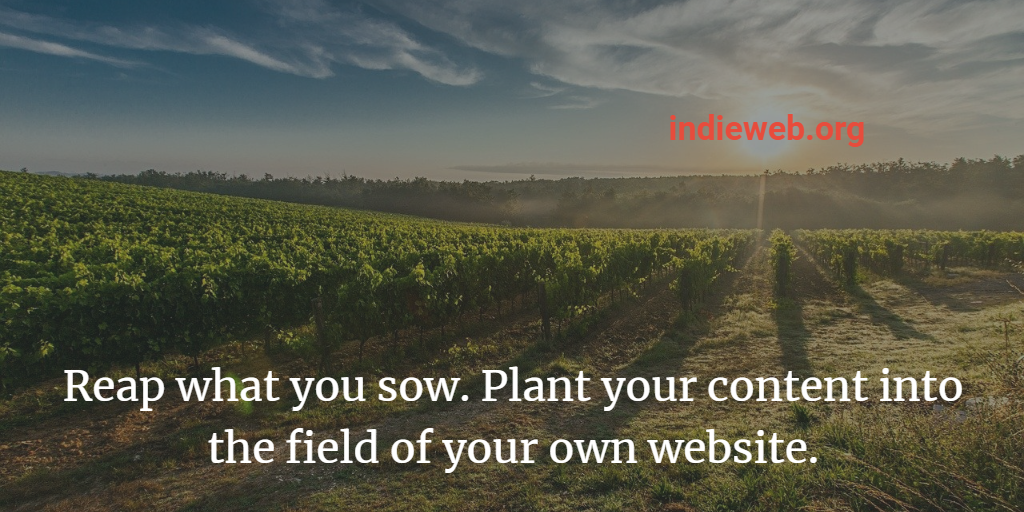own your data
✊
This article is a stub. You can help the IndieWeb wiki by expanding it.
own your data is an IndieWeb principle with two key parts: 1) your data lives primarily under your own domain, and 2) you are able to retain your access over time.
If you’re looking for the primary technique for owning your data on your domain, while distributing across platforms so your friends see your posts where they read streams, see:
- POSSE — Publish on your Own Site, Syndicate Elsewhere
Why
First, using your own domain gives you control over where people find and interact with you online. When you migrate to a new hosting provider or CMS, if your site stays on the same domain, everyone will still find you, regardless of whether they follow your site in a reader, land directly on your permalinks from other sites or search engines, or even type your domain directly into a browser.
Second, they say that change is the only constant, and web sites are no exception. Whether you stick with a host or CMS for a year, a decade, or a century, you're likely to change something eventually. When you do, you'll need usable access to all of your existing data. This includes export and import, data formats and standards, tools, protocols, permissions, rate limits, and more.
Also see why.
How
The Basics
Per Silo
Commit to owning your data by using your site, instead of a silo, for each silo you currently use.
Each silo you stop directly using (POSSE is ok), and use your own site instead, is a step forward in owning your data.
Per Post Type
Commit to owning each kind of post you publish, by using only your site to publish particular kinds of posts (again, POSSE is ok).
Each kind of post you stop posting directly to any/all silo(s), and use always use your own site to create instead, is a step forward in owning your data.
Per Post Type Per Silo
A more incremental but still significant step is stop posting a particular type of post to a particular silo, and always use your own site to publish that type of post instead of that silo.
IndieWeb Examples
 Add yourself here if you:
Add yourself here if you:
- have an indieweb site, and
- are using it exclusively to post either
- a particular kind of post (e.g. notes), and/or
- if you are posting to your site completely instead of a particular silo (e.g. Twitter) and note:
- started when: what date you started owning your data of what kind(s) of posts, or instead of which silo(s),
- backfilled since when: what earlier date (if any) you have backfilled your data from, of what kind(s) of posts
For the purpose of this page, please succinctly list, only
- specific silo(s) you have replaced usage of with your own site. E.g.: I use my own site instead of Twitter (notes, replies, favorites)
- post type(s) you use your own site for instead of / before any silo posts. E.g.: I post notes on my own site instead of Twitter, Facebook, Tumblr, etc.
- post type(s) instead of specific silo - what post type you use your own site for instead of / before a specific silo. E.g.: I post notes & replies on my own site instead of Twitter.
Optional details, for each of the above post types / or "instead of silos", optionally note which projects or tools help you do so.
Examples of what doesn't count:
- You post some notes on your own site, and some notes directly to Twitter.
- Why: All or nothing. Either you've committed and are following through with posting all your content of a specific kind to your own site, or you don't yet "own your data" of that type.
Examples of what belongs on your user page instead:
- owned other things besides post types / instead of silos (sites, domain names, project installs)
- what other sites you post to
Examples of what doesn't disqualify you:
- A small number of test posts on any given silo of any given content type, especially if you're doing it as research for how to best POSSE to that silo, especially if you document the results of your research here on the wiki. Though for research purposes, you really should create one or more separate test accounts on silos.
gRegor Morrill
 gRegor Morrill has:
gRegor Morrill has:
- owned articles since 2002-01-26. [1].
- owned photos since 2017-04-15 [2]
- POSSE manually to Instagram, occasionally POSSE to Twitter with Bridgy Publish, backfeed via Bridgy
Tantek
 Tantek Çelik has publicly:
Tantek Çelik has publicly:
- owned his articles since 2002-08-08.
- owned his notes since 2010-01-01.
- owned his events since 2017-06-26.
- instead of Twitter, posted on his own site:
- notes since 2010-01-01, POSSE to Twitter since 2010-01-26
- @-replies since 2013-05-12, POSSEd to Twitter (same day).
- favorites as likes, since 2014-12-31, using Bridgy Publish to POSSE likes of tweets to favoriting those tweets on Twitter.
- instead of GitHub posted on his own site:
- issues since 2018-02-21
- replies to issues (since 2018-02-19, post about)
- replies to comments on issues (since 2018-02-21)
- reactions to GitHub comments (since 2018-02-24), to GitHub issues (since 2018-02-26), to GitHub pull requests (since 2018-07-09
Notes:
- not yet ownyourreplies. I can't say I yet I follow "ownyourdata" for ALL my replies, as I still post replies directly to Instagram posts, and the past have posted replies directly to posts on Facebook (stopped in 2020), whereas I should be posting even those replies on my own site first, and then POSSEing them to Facebook manually. Thus I've scoped my "ownyourdata" of replies to only being a replacement for my use of Twitter and GitHub to post replies.
- not yet ownyourlikes. I also can't yet say I follow "ownyourdata" for ALL my likes, as I still like photos directly on Instagram, and posts on Facebook (stopped in 2020).
- not yet ownyourRSVPs. While I have owned my public RSVPs (especially "going") since 2017-01-01, I still RSVP to private events on Facebook. I’m not sure how to avoid this short of giving up on private FB events. I also have been clicking the "I’m Going" on IndieWeb HWC Events pages without always posting an RSVP on my own site.
- not yet ownyourissues. While I’ve owned 100% of my public issues posted to GitHub, I still post issues directly (and without my own copy) to Bugzilla.
- no private posts yet. I don't have a mechanism for publishing private posts yet, so I am still manually posting those elsewhere, like Swarm checkins, comments, and likes, and private GitHub repos for example.
Snarfed
 Ryan Barrett has:
Ryan Barrett has:
- owned his articles and notes [3] since 2003-06-29 [4]
- owned his photos [5] since 2003-03-06 [6]
- owned his replies/comments [7] since 2013-10-02 [8]
- owned his likes/favorites [9] since 2014-02-02 [10]
- owned his reposts [11] since 2014-03-13 [12]
- owned his events [13] and rsvps [14] since 2014-01-15 [15]
- instead of Twitter:
- posted notes and photos on his own site always, replies [16] since 2013-10-02 , favorites [17] since 2014-02-02, retweets [18] since 2014-03-13
- POSSEd via Bridgy Publish, backfed via Bridgy
- read his Twitter stream via twitter-atom and responded via web bookmarklets and Android flow instead of Twitter's own web UI and app
- instead of Facebook:
- posted articles, notes, and photos on his own site always, comments [19] since 2013-10-02, likes [20] since 2014-02-02
- POSSEd via Bridgy Publish, backfed via Bridgy
- PESOS backfilled articles and notes between 2009-10-15 [21] and 2012-10-28 [22] with freedom.io
- read his Facebook news feed via facebook-atom and responded via web bookmarklets and Android flow instead of Facebook's own web UI and app
- instead of Instagram, posted:
- posted photos on his own site always [23], POSSEd manually, backfed via Bridgy
- read his Instagram stream via instagram-atom instead of the Instagram app
- instead of Google+, posted on his own site:
- articles, notes, and photos always, POSSEd manually, backfed via Bridgy
Bear
 bear has
bear has
- owned his articles since 2003-12-18. [24].
- owned his own replies since May of 2014.
- owned his own replies to others since November of 2014 but until I add in-reply-to' markup I cannot call them comments.
Aaron Parecki
- owned his articles since 2006-04-14
- owned his bookmarks since 2010-12-17[25]
- owned his notes and replies, and POSSE to Twitter since 2012-08-19[26]. [27]twitter copy
- owned his photos since 2014-03-08[28] (launched at IndieWebCamp SF 2014) and occassionally manually POSSEs to Twitter since 2014-05-06[29]on Twitter
- owned his biking, running, and driving since 2014-07-30[30]
- owned his videos since 2014-09-10[31]
- owned his food & drink posts since 2014-10-17[32]
- owned his cat since 2014-11-01[33]
- owned his reposts since 2014-11-02[34]
- owned his likes since 2014-12-26[35] (launched as part of the 2015-01-01 commitments)
Kartik
Note: kartikprabhu.com links appear to have stopped working (2022-10-24 or earlier) without a redirect. Manually add www. at the start until these links have been fixed.
 Kartik Prabhu has:
Kartik Prabhu has:
- owned his articles since 2013-06-01. Invictus.
- owned his notes since 2014-03-08. [36].
- instead of Twitter, posted on his own site:
- notes and POSSE to Twitter since 2014-03-20. original twitter copy — with original post permalinks until 2017-07-01 https://twitter.com/kartik_prabhu/status/881282109549277184
- photos and POSSE to Twitter since 2014-07-27. original
- instead of Google+, posted on his own site:
- notes and manual POSSE to Google+ since ??
- instead of on others blogs not supporting webmentions, posted on his own site:
- replies and manual POSSE replies to others blogs not supporting webmentions since 2014-08-28. original
Sebastiaan Andeweg
 Sebastiaan Andeweg has:
Sebastiaan Andeweg has:
- instead of Instagram, posted to his own site:
- photos and POSSE to Instagram (since 2016-11-22, with import of all earlier photos)
Marty McGuire
 Marty McGuire has:
Marty McGuire has:
- instead of Twitter, posted to his own site:
- instead of Facebook, posted to his own site:
- instead of Goodreads, posted to his own site:
- instead of ... a non-existent silo to track podcast listens:
Notes:
- Not yet owning all replies. Still making some replies directly on Twitter, Facebook.
- Can and does reply to IndieWeb-enabled posts on his own site since at least 2016-11.
- Not yet owning all likes and reacji. Still like some posts on Instagram, Twitter, Facebook
- Not yet owning all bookmarks. Still bookmarks privately with Pinboard, but posts some bookmarks publicly since 2017-04.
- Not yet owning all RSVPs. Still RSVPs to some events on Facebook.
- Can and does RSVP to IndieWeb-enabled events on his own site since 2016-06.
Joe Crawford
This section is a stub. You can help the IndieWebCamp wiki by expanding it.
- owns his entire history of bookmarks for over 20 years
- ...
... add yourself ...
Previous Examples
These are examples who owned their data for periods of time, but either went offline, or resumed posting silo-first or silo-only content at some point.
Ben Werdmuller
 Ben Werdmüller has, since 2013-07-11, using Known:
Ben Werdmüller has, since 2013-07-11, using Known:
- instead of Twitter, posted to his own site:
- notes and POSSE to Twitter until ~2022 or earlier (e.g. https://twitter.com/benwerd/status/1584334951243079681 and other recent native/exclusive-Tweets)
- instead of Facebook, posted
- notes and POSSE to Facebook until ????
- instead of LinkedIn, posted
- notes and POSSE to LinkedIn until ????
- instead of Flickr, posted
- photos and POSSE to Flickr until ????
The Dod
dubiousdod.org links appear dead as of 2022-10-24 (or earlier — need to check Internet Archive for when it went offline and document that here with permalinks to belowmentioned post types)
 ĎÚβĨŐÚŚ Dod had:
ĎÚβĨŐÚŚ Dod had:
- instead of Twitter, posted to his own site:
- notes, replies, repost, favorites and POSSE to Twitter using his RedWind install since November 2014 until 2022 (or earlier)
- Uses a bookmarklet to reply/reshare/fav stuff (including tweets).
- Uses Bridgy to backfeed Twitter interactions as webmentions
Hashtag
#ownyourdata is a rallying cry hashtag for aggregating content across indie web sites and 3rd-party silos about "owning your data", "owning your own data" etc.
- Tagboard: #ownyourdata - hashtag aggregator across Twitter, Instagram, Google+.
- Google News Search: ownyourdata
- ...
#ownyourdata posts tend to be a a subset of Posts about the IndieWeb.
Criticism
Following a discussion [37] between  Aaron Parecki and
Aaron Parecki and ![]() Peter Molnar that was triggered by specific wording found in an indiweb critic post [38], namely the sentence:
Peter Molnar that was triggered by specific wording found in an indiweb critic post [38], namely the sentence:
Legally, any and all content that you post to a silo is no longer "your content"
 Aaron Parecki: https://help.instagram.com/581066165581870?ref=dp "We do not claim ownership of your content, but you grant us a license to use it"
Aaron Parecki: https://help.instagram.com/581066165581870?ref=dp "We do not claim ownership of your content, but you grant us a license to use it"- [...]
 Aaron Parecki: giving up your ownership means you can no longer do things with it yourself such as giving other people licenses
Aaron Parecki: giving up your ownership means you can no longer do things with it yourself such as giving other people licenses- [...]
 Peter Molnar: one would assume [...] owning == option to grant and to revoke rights/access
Peter Molnar: one would assume [...] owning == option to grant and to revoke rights/access Peter Molnar: and with sending it to a silo, the revoking part is, most of the times, thrown away
Peter Molnar: and with sending it to a silo, the revoking part is, most of the times, thrown away Peter Molnar: hence "owning" from that point on, is incomplete(?)
Peter Molnar: hence "owning" from that point on, is incomplete(?)
See Also
- principles
- own your links
- own your likes
- own your replies
- own your comments
- Posts about the IndieWeb
- 2018-05-17 Google’s Selfish Ledger is an unsettling vision of Silicon Valley social engineering
Of course, the concept is premised on Google having access to a huge amount of user data and decisions. Privacy concerns or potential negative externalities are never mentioned in the video. The ledger’s demand for ever more data might be the most unnerving aspect of the presentation.
- https://www.lvm.fi/documents/20181/859937/MyData-nordic-model/
- https://mydatafi.wordpress.com/
- https://twitter.com/kplawver/status/1071930638498963461
- "In watching people discuss where they’re going, they’re all STILL talking about going to another platform owned by someone else. I have yet to see anyone say anything about doing a traditional blog, and that makes me sad. Own. Your. Content." @kplawver December 10, 2018
- https://www.thersa.org/discover/publications-and-articles/rsa-blogs/2019/05/uber-ipo
- https://twitter.com/AOC/status/1230352135335940096 “You don't own your data, & you should. And btw, the internet was created w/ publicly funded research.” - AOC
- "Ironically, the reason many tech platforms have created billionaires is bc they track you without your knowledge, amass your personal data& sell it without your express consent.
You don’t own your data, & you should. And btw, the internet was created w/ publicly funded research." @AOC February 20, 2020
- "Ironically, the reason many tech platforms have created billionaires is bc they track you without your knowledge, amass your personal data& sell it without your express consent.
- Why I'm leaving Micro.blog, 2018
- "Manton says owning your domain so you can move your content without breaking URLs is owning your content, whereas I believe if your content still lives on someone else's server, and requires them to run the server and run their code so you can access your content, it's not really yours at all, as they could remove your access at any time." - Belle B. Cooper on how owning one's data can mean very different to one another.
- Another perspective on ownership of data: https://twitter.com/AnoukRuhaak/status/1321509912455819264
- "Yes! Ownership implies a right to alienate (ie sell) the thing you own at which point we lose all the rights to the thing. A rights-based framework works better imo especially combined with an approach to data governance that focuses on collective needs and interests." @AnoukRuhaak October 28, 2020
- https://howtomeasureghosts.substack.com/p/data-isnt-oil-so-what-is-it
- https://origami.kosmulski.org/blog/2021-05-16-building-personal-origami-website-2021
- https://toot.cat/@dredmorbius/106626525028126811
- "A Defunct Video Hosting Site Is Flooding Normal Websites With Hardcore Porn... As pointed out by Twitter user @dox_gay, hardcore porn is now embedded on the pages of the Huffington Post, New York magazine, The Washington Post, and a host of other websites. This is because a porn site called 5 Star Porn HD bought the domain for Vidme, a brief YouTube competitor founded in 2014 and shuttered in 2017. Its Twitter account is still up, but the domain lapsed. ...The trend toward embeds rather than screenshots or direct copying has long struck me as ill-conceived.At least it's only pr0n. As a vector for malware / spyware injection, this could be even more interesting.https://www.vice.com/en/article/qj8xz3/a-defunct-video-hosting-site-is-flooding-normal-websites-with-hardcore-pornHN discussion: https://news.ycombinator.com/item?id=27924777#infosec #bitrot #pr0n #DNS #ItsAlwaysDNS #LapsedDomains #EmbeddedContent #malware #spyware #risks #infosec" @dredmorbius July 22, 2021
- What not to do as a company if you support users owning their data: https://twitter.com/sebmck/status/1531740565615910912
- ""You should own your data." Like my address." @sebmck May 31, 2022
- https://twitter.com/m_ott/status/1539868871510851586
- "Twitter is introducing “Notes” to make you blog on their platform. I have a notes section on my personal site. I own the words I write there. It is my playground and my home on the Web. One of the best decisions I ever made.
https://matthiasott.com/articles/into-the-personal-website-verse" @m_ott June 23, 2022
- "Twitter is introducing “Notes” to make you blog on their platform. I have a notes section on my personal site. I own the words I write there. It is my playground and my home on the Web. One of the best decisions I ever made.
- Business perspective: Own Your Digital Content
- Kevin Kelly article https://kk.org/thetechnium/the-propriety-path-platform/
- https://josem.co/own-your-work/
Buy a domain you like, create a simple site with a technology you can maintain for a long time, like a static HTML site or even a simple WordPress theme can help you if you’re not tech-savvy, and pour your creativity there. Do you want to share your writings, photos, or designs? That should be the place.
- “I want to own my words and thus I post on my own domain. […] By using my domain I can be sure that I can make material available and present it in the way I like.” https://martinfowler.com/articles/2023-social-media.html
- “OWN YOUR WORDS
- ^ 2012-08-19 Your words are wasted
…It needs to be said again, perhaps this time more strongly. Your Blog is The Engine of Community. Dammit.
Own Your Words
I've been blogging here for over 10 years. On my domain, running my software pushing out HTML when you visit the site on any device and RSS or ATOM…
- 2024-01-11 We Need To Talk About Digital Ownership - Citation Needed Newsletter
- 2024-11-26 X's Objection to the Onion Buying InfoWars Is a Reminder You Do Not Own Your Social Media Accounts
- own your bookmarks! 20y worth of bookmarks owned by
Joe Crawford: Owning my own bookmarks over 20 years
Elsewhere
- Zero Data: apps and protocols that focus on storing data in sovereign spaces.

